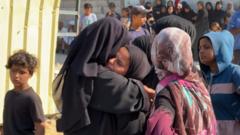As the humanitarian situation in Gaza grows more dire, Israel has announced aid measures, including airdrops and temporary military pauses. However, skepticism abounds, with Hamas labeling these actions as mere deception while humanitarian agencies warn of worsening conditions and continued disregard for international law.
Israel's Humanitarian Gesture Amid Ongoing Gaza Crisis

Israel's Humanitarian Gesture Amid Ongoing Gaza Crisis
In response to international outrage over hunger in Gaza, Israel has introduced measures aimed at enhancing humanitarian aid, including airdrops and designated aid corridors, amid persistent military activity.
Article:
In a climate rife with global criticism over the humanitarian crisis in Gaza, Israel has taken steps to alleviate concerns by announcing a set of measures designed to enhance the humanitarian response. The Israel Defence Forces (IDF) stated that it would begin airdrops of aid, with the first operation executed during the night, followed by support from the United Arab Emirates air force.
In a bid to address claims of starvation, Israel declared it would introduce a "tactical pause" in military activities in select areas and implement designated humanitarian corridors. However, Hamas has dismissed these actions as a "deception," accusing Israel of attempting to polish its global image while maintaining a blockade on essential aid.
Despite these measures, a striking contradiction arose as the IDF launched an airstrike even during the proclaimed "tactical pause," resulting in civilian casualties, including the tragic deaths of a mother and her four children. International allies, including prominent European nations, have expressed serious concerns regarding Israel's accountability for the humanitarian disaster unfolding in Gaza.
Previously, Israel enforced a comprehensive blockade, severely limiting aid entry and establishing a controversial system dubbed the 'Gaza Humanitarian Foundation' (GHF), which has been criticized for being militarized and inhumane. Humanitarian organizations have refused to collaborate with the GHF, citing serious risks to civilian safety, with reports showing over 1,000 Palestinians shot attempting to access aid at GHF sites.
According to Jonathan Whittall, the head of the UN’s office for the coordination of humanitarian affairs (OCHA) in the region, the situation has escalated into a severe humanitarian crisis requiring immediate improvements in aid transit and infrastructure. For Israel’s new measures to achieve any significant impact, urgent action is needed to alleviate both restrictions and ensure safe access to aid for the beleaguered population.
The ongoing conflict has led to mounting scrutiny of Israeli officials, including Prime Minister Benjamin Netanyahu and former Defense Minister Yoav Gallant, who are subject to an arrest warrant from the International Criminal Court for alleged war crimes, including starvation as a method of warfare.
Despite Israel’s claim of accomplishing significant aid drops, the practice has been typically reserved for extreme situations where ground access is impossible. Critics argue that in a context where land routes are operational, such measures reflect desperation rather than a real solution to the dire needs of the Gazan population.
As international observers continue to evaluate the precarious conditions faced by Gaza’s residents, the specter of ongoing military actions muddles hopes for meaningful humanitarian assistance, underscoring the urgent need for a ceasefire and comprehensive aid strategy to stave off further suffering. In a territory already grappling with the effects of war and displacement, the challenge to address food insecurity is greater than ever.
In a climate rife with global criticism over the humanitarian crisis in Gaza, Israel has taken steps to alleviate concerns by announcing a set of measures designed to enhance the humanitarian response. The Israel Defence Forces (IDF) stated that it would begin airdrops of aid, with the first operation executed during the night, followed by support from the United Arab Emirates air force.
In a bid to address claims of starvation, Israel declared it would introduce a "tactical pause" in military activities in select areas and implement designated humanitarian corridors. However, Hamas has dismissed these actions as a "deception," accusing Israel of attempting to polish its global image while maintaining a blockade on essential aid.
Despite these measures, a striking contradiction arose as the IDF launched an airstrike even during the proclaimed "tactical pause," resulting in civilian casualties, including the tragic deaths of a mother and her four children. International allies, including prominent European nations, have expressed serious concerns regarding Israel's accountability for the humanitarian disaster unfolding in Gaza.
Previously, Israel enforced a comprehensive blockade, severely limiting aid entry and establishing a controversial system dubbed the 'Gaza Humanitarian Foundation' (GHF), which has been criticized for being militarized and inhumane. Humanitarian organizations have refused to collaborate with the GHF, citing serious risks to civilian safety, with reports showing over 1,000 Palestinians shot attempting to access aid at GHF sites.
According to Jonathan Whittall, the head of the UN’s office for the coordination of humanitarian affairs (OCHA) in the region, the situation has escalated into a severe humanitarian crisis requiring immediate improvements in aid transit and infrastructure. For Israel’s new measures to achieve any significant impact, urgent action is needed to alleviate both restrictions and ensure safe access to aid for the beleaguered population.
The ongoing conflict has led to mounting scrutiny of Israeli officials, including Prime Minister Benjamin Netanyahu and former Defense Minister Yoav Gallant, who are subject to an arrest warrant from the International Criminal Court for alleged war crimes, including starvation as a method of warfare.
Despite Israel’s claim of accomplishing significant aid drops, the practice has been typically reserved for extreme situations where ground access is impossible. Critics argue that in a context where land routes are operational, such measures reflect desperation rather than a real solution to the dire needs of the Gazan population.
As international observers continue to evaluate the precarious conditions faced by Gaza’s residents, the specter of ongoing military actions muddles hopes for meaningful humanitarian assistance, underscoring the urgent need for a ceasefire and comprehensive aid strategy to stave off further suffering. In a territory already grappling with the effects of war and displacement, the challenge to address food insecurity is greater than ever.




















